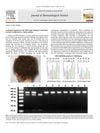 104 citations,
January 2016 in “Food & Function”
104 citations,
January 2016 in “Food & Function” Olive oil compounds may help prevent cancer in animals, but human results are mixed.
 97 citations,
March 2002 in “Molecular and cellular biology”
97 citations,
March 2002 in “Molecular and cellular biology” Mutant CDP/Cux protein causes hair defects and reduced male fertility in mice.
 25 citations,
January 2000 in “Hormone Research in Paediatrics”
25 citations,
January 2000 in “Hormone Research in Paediatrics” Mutations in the androgen receptor gene cause Androgen Insensitivity Syndrome, affecting sexual development.
 21 citations,
June 2016 in “Genesis”
21 citations,
June 2016 in “Genesis” Researchers identified specific genes that are important for mouse skin cell development and healing.
 14 citations,
April 2011 in “Journal of the American Academy of Dermatology”
14 citations,
April 2011 in “Journal of the American Academy of Dermatology” Researchers found a gene mutation responsible for a rare hair loss condition.
 13 citations,
November 2009 in “Journal of Dermatological Science”
13 citations,
November 2009 in “Journal of Dermatological Science” A gene mutation causes woolly hair in a Syrian patient.
 12 citations,
August 2022 in “Stem cell reviews and reports”
12 citations,
August 2022 in “Stem cell reviews and reports” Increasing PBX1 reduces aging and cell death in hair follicle stem cells by boosting SIRT1 and lowering PARP1 activity.
 12 citations,
June 2021 in “Scientific Reports”
12 citations,
June 2021 in “Scientific Reports” Curcumin may help reverse aging by targeting specific genes.
 9 citations,
November 2021 in “Frontiers in Cell and Developmental Biology”
9 citations,
November 2021 in “Frontiers in Cell and Developmental Biology” PBX1 helps reduce aging and cell death in hair follicle stem cells by decreasing DNA damage, not by improving DNA repair.
 March 2019 in “Journal der Deutschen Dermatologischen Gesellschaft”
March 2019 in “Journal der Deutschen Dermatologischen Gesellschaft” Rothmund-Thomson syndrome type 2 can cause chronic, poorly healing wounds.
 1 citations,
January 2021
1 citations,
January 2021 CD4+ skin cells may be precursors to basal cell carcinoma.
 32 citations,
February 2008 in “Developmental dynamics”
32 citations,
February 2008 in “Developmental dynamics” Mice without the Sp6 gene have problems developing several body parts, including hair, teeth, limbs, and lungs.
 October 2007 in “Journal of Investigative Dermatology”
October 2007 in “Journal of Investigative Dermatology” The meeting highlighted the genetic basis of female pattern hair loss and various skin health insights.
 24 citations,
November 2008 in “Arquivos Brasileiros de Endocrinologia & Metabologia”
24 citations,
November 2008 in “Arquivos Brasileiros de Endocrinologia & Metabologia” Four patients with a type of rickets and hair loss had different mutations in their vitamin D receptor gene, causing it to not work properly.
 1 citations,
January 2011 in “Springer eBooks”
1 citations,
January 2011 in “Springer eBooks” Histone demethylases play a key role in the development of many diseases and may be targets for treatment.
 119 citations,
October 2011 in “Journal of Veterinary Internal Medicine”
119 citations,
October 2011 in “Journal of Veterinary Internal Medicine” Rhodococcus equi causes severe pneumonia in young foals, and effective vaccines are needed due to foals' weak immune responses.
 61 citations,
September 2010 in “Genomics”
61 citations,
September 2010 in “Genomics” The study found that immune responses disrupt hair growth cycles, causing hair loss in alopecia areata.
 54 citations,
May 2018 in “International journal of risk & safety in medicine”
54 citations,
May 2018 in “International journal of risk & safety in medicine” Antidepressants, 5α-reductase inhibitors, and isotretinoin can cause long-lasting sexual dysfunction.
 32 citations,
July 2012 in “Stem Cells Translational Medicine”
32 citations,
July 2012 in “Stem Cells Translational Medicine” Vitamin D3 can help improve hair growth by enhancing the function of specific skin cells and could be useful in hair regeneration treatments.
 25 citations,
August 2006 in “Human Reproduction”
25 citations,
August 2006 in “Human Reproduction” Oral contraceptives lower testosterone levels in women, especially those with certain genetic traits, and may be linked to increased breast cancer risk.
 10 citations,
June 2011 in “Movement Disorders”
10 citations,
June 2011 in “Movement Disorders” THAP1 gene changes do not affect DYT1 dystonia; finasteride may help reduce tics and OCD in Tourette syndrome.
 7 citations,
January 1994 in “Annual Reports in Medicinal Chemistry”
7 citations,
January 1994 in “Annual Reports in Medicinal Chemistry” Understanding how androgens work is key for creating new treatments for prostate issues and hair/skin conditions.
 3 citations,
March 2014 in “Journal of Industrial Microbiology & Biotechnology”
3 citations,
March 2014 in “Journal of Industrial Microbiology & Biotechnology” Scientists found a new gene in a bacterium that can modify an immunosuppressant drug, potentially helping to treat hair loss.
 March 2017 in “Fundamental & Clinical Pharmacology”
March 2017 in “Fundamental & Clinical Pharmacology” The model and estimator can predict drug exposure in kidney transplant patients well.
 188 citations,
May 2009 in “Plant physiology”
188 citations,
May 2009 in “Plant physiology” Researchers found 19 genes important for root hair growth in a plant called Arabidopsis.
 141 citations,
August 2018 in “Nature Reviews Microbiology”
141 citations,
August 2018 in “Nature Reviews Microbiology” Some viruses can cause cancer by changing cell processes and avoiding the immune system; vaccines and targeted treatments help reduce these cancers.
 68 citations,
May 2011 in “European Journal of Dermatology”
68 citations,
May 2011 in “European Journal of Dermatology” Acne is caused by genetics, diet, hormones, and bacteria, with treatments not yet curative.
 66 citations,
April 1995 in “The journal of cell biology/The Journal of cell biology”
66 citations,
April 1995 in “The journal of cell biology/The Journal of cell biology” A new protein was made to detect specific skin cell growth receptors and worked in normal skin but not in skin cancer cells.
 54 citations,
April 2010 in “Baillière's best practice and research in clinical endocrinology and metabolism/Baillière's best practice & research. Clinical endocrinology & metabolism”
54 citations,
April 2010 in “Baillière's best practice and research in clinical endocrinology and metabolism/Baillière's best practice & research. Clinical endocrinology & metabolism” Impaired androgen production in 46,XY DSDs causes ambiguous genitalia and requires long-term care.
 24 citations,
October 2014 in “Cold Spring Harbor Perspectives in Medicine”
24 citations,
October 2014 in “Cold Spring Harbor Perspectives in Medicine” Genetic research has advanced our understanding of skin diseases, but complex conditions require an integrative approach for deeper insight.






























